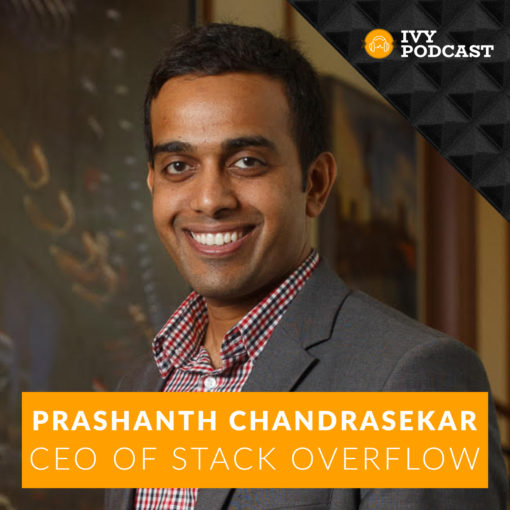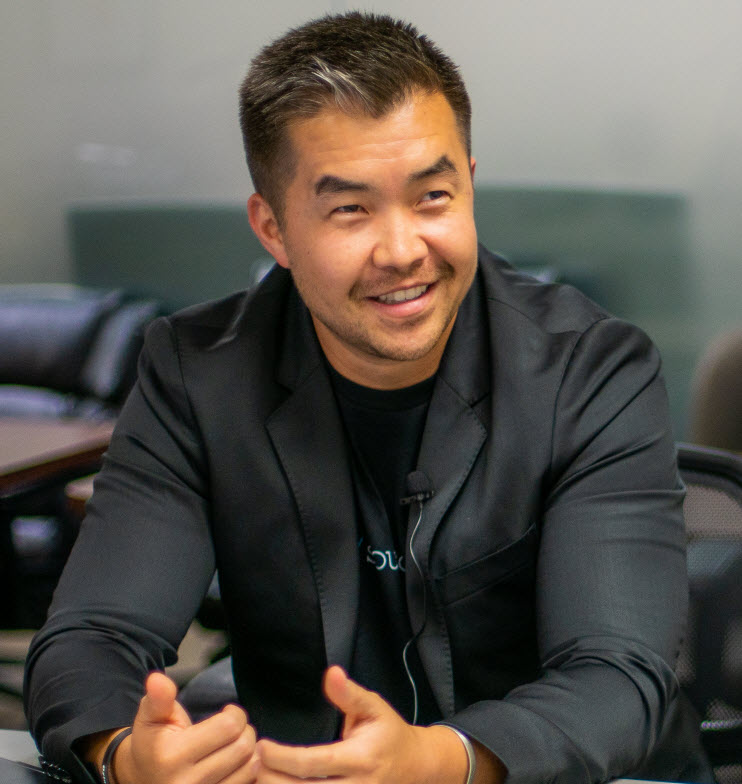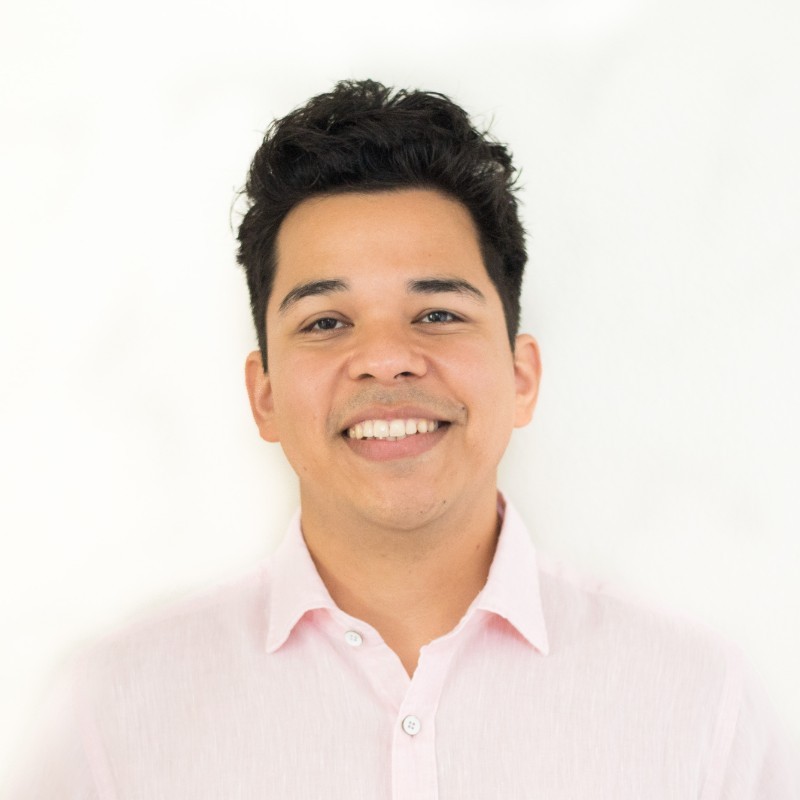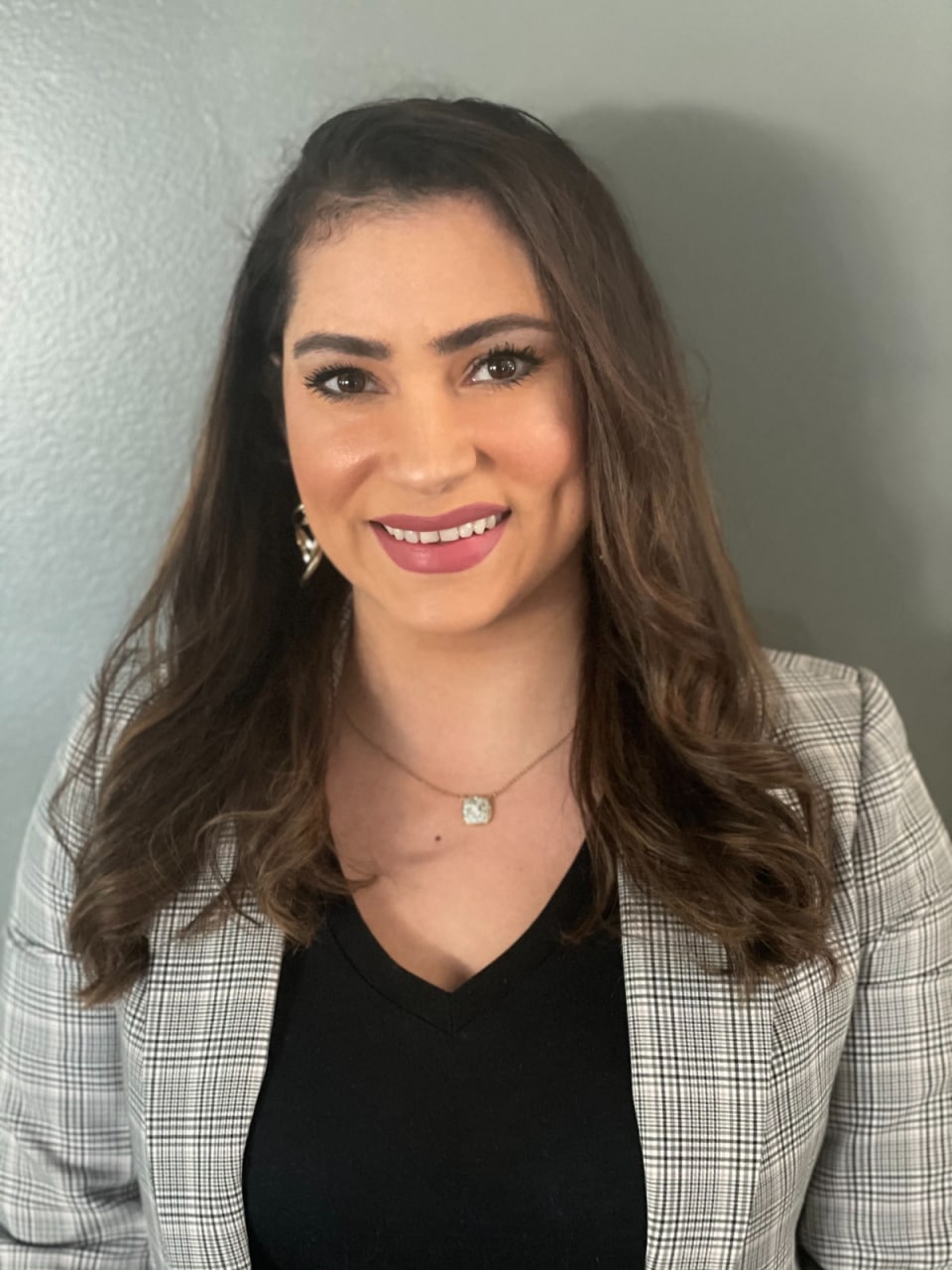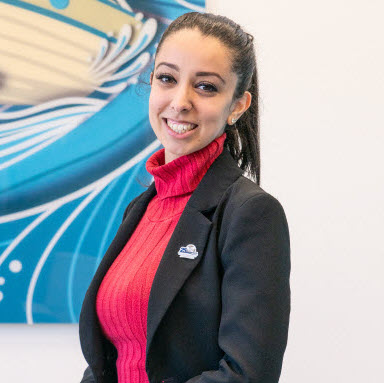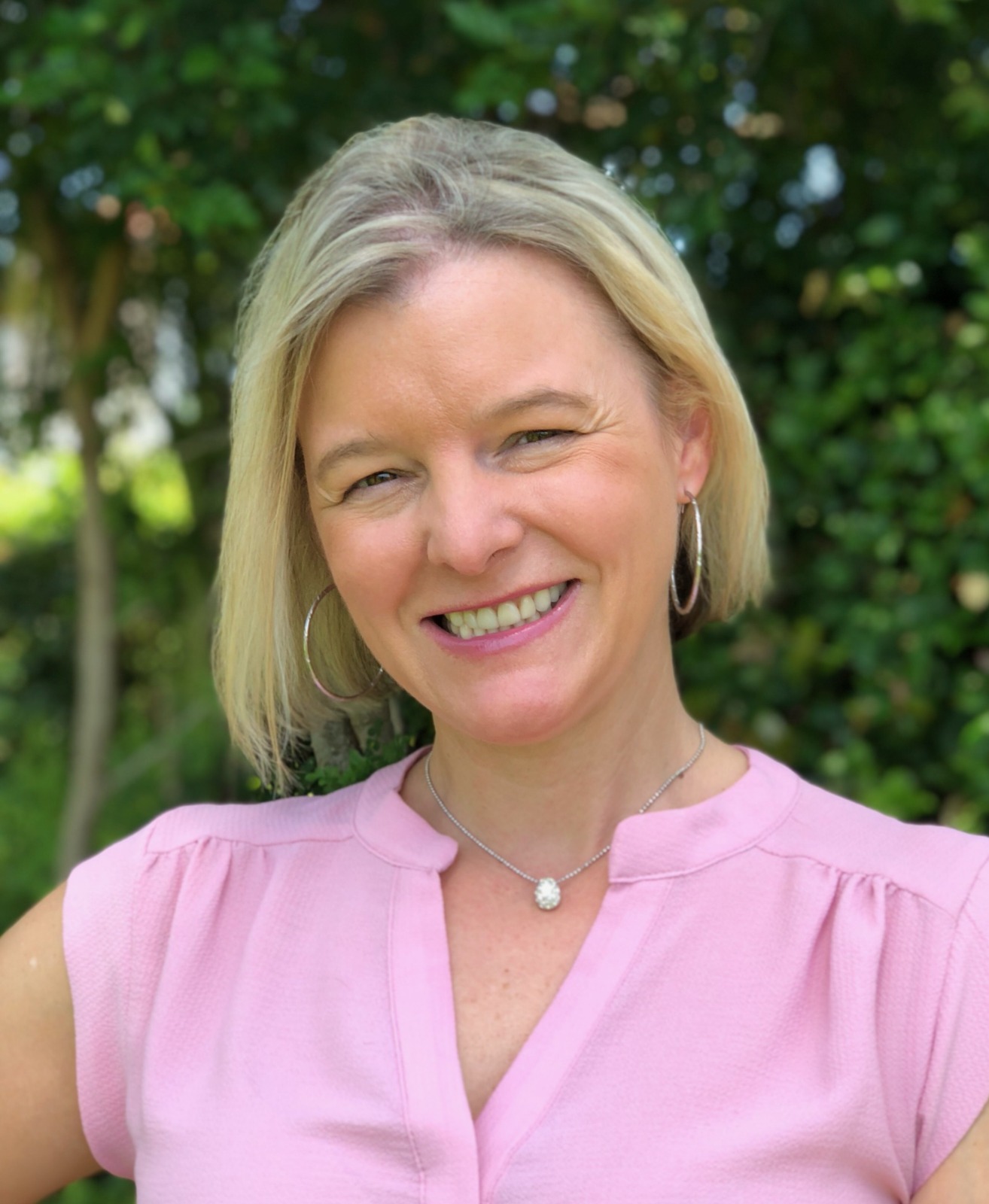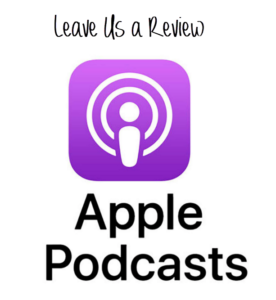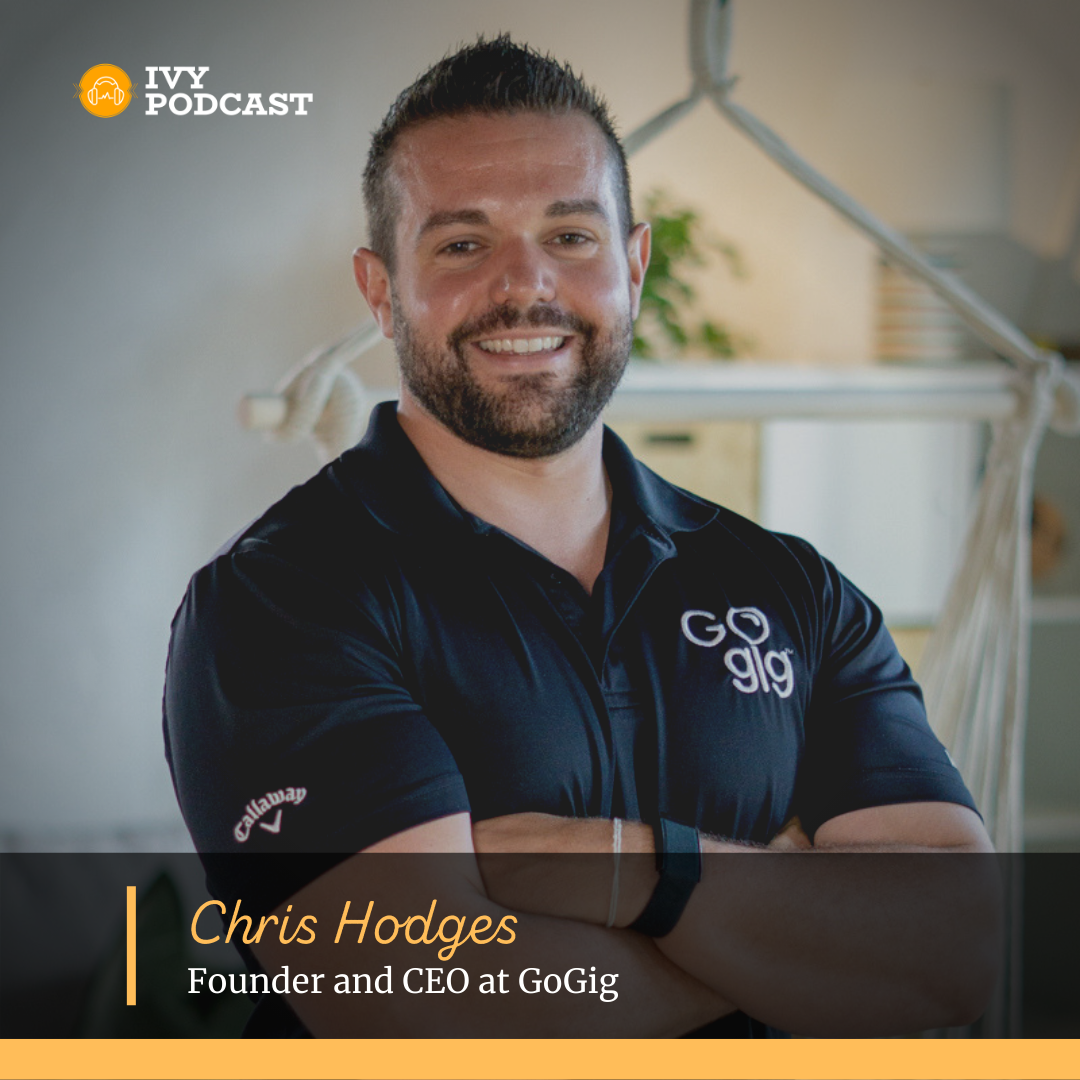
GoGig is Chris’s second successful HR Tech company, and still holds a seat on the Board of Directors for the other venture: Timesly (mytimesly.com). In his 13+ years of experience, Mr. Hodges has accomplished the following before the age of 30: Co-Founded two and worked on three successful technology ventures with one successful exit, advised & invested in other startups, worked in B2B sales, built brands from the ground up, developed brands to the next level, increased customer retention and loyalty, promoted on all social media platforms and launched multimillion dollar products, both online and in retail. He likes to say that he “generally executes on his best big ideas instead of throwing tons of ideas out there with no execution.”
Mr. Hodges is a graduate of Purdue University’s Krannert School of Management with a BS in Management, and holds an MBA from University of Florida’s Hough Graduate School of Business.
Episode transcription:
C: Hey, my name is Chris Hodges. I am the founder and CEO of gig.
J: Chris. Thanks so much for finding time to join us on the Ivy podcast today this afternoon. Can you tell us a little bit more first about your background, where you’ve come from your career path and then I'd like to spend a few minutes talking about your current company?
C: Yeah, absolutely. Going back, I graduated from Purdue out of management school there. And in 2010, I quickly just kind of accelerated my career into a sales path, where I found out that I was pretty good selling things and separating people from their money, working for a medium sized B2B software as a service company, out of Kalamazoo, Michigan, just due to some corporate culture things, and me wanting to make an advancement in my career. I ended up jumping into the prepaid wireless world, running and growth, you know, at a prepaid wireless company, marketing sales, customer retention revenue, for a brand that was doing just North of 650 million in annual revenue, there were about a million and a half customers. So we grew that company pretty quick. Obviously went through an exit and I managed the brand after, you know, post acquisition. And then I went back to school, got my MBA at university of Florida during that MBA program, conceptualized what is now GoGig, jumped out into that. And here we are. It's all she wrote.
J: Awesome. Well, that's pretty exciting. Quite a path. So tell us a little bit more about GoGig. What more specifically, curious, what problem are you guys solving with your products and services currently in, what motivated you to start this company?
C: The premise of the business, the underlying technology is that we thought of wanting to apply anonymity, or remaining anonymous, in talent acquisition. So, the premise of anonymity removes the implicit bias and hiring, so it removes all discriminatory practice. Based on age, race, ethnicity, gender, country of origin, religion, and veteran status. Sso that way candidates don't have to feel uncomfortable coming into our platform, feeling like they might be discriminated against in any way, shape or form with their protected classes. And, also at the same time, it focuses on upward mobility and career transition. So, you're an experienced professional, you're in a job, and you want to advance your career safely without your boss down the hall, breathing down your neck. So, using the premise of anonymity, it helps more of that experience, passive job seeker that wants to safely input their career desires, to focus on more the human elements of what makes somebody up for who they are and allow them to safely do that. So focuses on a different type of job seeker that would join our platform than what you would traditionally see on a typical job board site. Really the idea was conceived, sitting in the back of the room of a finance class in my MBA program, not paying attention. At the University of Florida, a lot of those people in an executive program are passive job seekers. I didn't know what this was at the time, but there's a bunch of people. There's doctors, lawyers, engineers, folks of all walks of life, just kind of sitting in the room, I'm paying 78 grand to get three letters at the end of their name to advance their career. So, when they did that, you got it. They wanted to connect with the alumni, they're paying a premium to be a Gator. So they wanted to connect with other alumni that are smart, that had graduated from there. They're making money and growing their network. And, they complained and complained and complained that that wasn't happening enough to where they sent a career services team in career services gets up in front of the room and says, pretty underwhelming pitch about here's this job board site. You can go through to apply to jobs where you can drive all the way to Gainesville and go to this career fair that nobody wants to attend. And that was it. So, there just wasn't any technology that bridge that gap that really helped this type of professional that wanted to lean on their Alma mater remain anonymous, established, recalling conversations without formally applying to anything because these people aren't really active at job seekers. So, I sparked the idea, wrote the algorithm. built the team and then you just kind of go down the path of jumping into the deep end from there.
J: Wow. That's a pretty interesting, pretty unique story. And immediately, as you were telling me a little bit about your experience, going through the university and graduating, I went through different institutions as well. In Montana, did the NSU here in South Florida, did Harvard, and I can relate on different levels as far as utilizing the alumni network and then having the platform in place that will really allow you to provide for these opportunities to not only leverage your Alma mater network, but also when it comes to job seekers and being able to target and build relationships from that standpoint. So that's pretty interesting. And when you talk about the anonymity aspect of this, tell me a little bit more about this. What does that mean? Is that in terms of being able to anonymously build a profile, specify what my career interests are, and then also be able to target particular companies and employers. Is that, is that the premise?
C: There's two different ways to answer your question. The first is like blind resumes. There've been studies about blind resumes for years where it's like, Hey, if we take the name off of something, does that remove selection bias? Where Caucasian males that look like me get selected 50% more often than protected classes. So they did studies to say, okay, if we scrubbed the name, does that remove that selection bias and inherently from the equation? The answer is it kind of does, but a savvy recruiter, a lot of the folks that you've had on this podcast can Google two pieces of information from a resume, even if you scrubbed the name off of it and figure out what the person is. So LinkedIn attempted to do this, where they turn the switch on, do you name blind to your current employer? And you can input everything you want on your next move. Nobody's going to figure it out, but they got sued for that. Bunch of employees turned the switch on LinkedIn or HR employees were making LinkedIn recruiter accounts under fake names and seeing all the employees at their organization that we're searching. So when we saw this sort of just unfold, they quickly figured out that you can't just make a blind resume. You have to make a truly anonymous platform to collect a unique set of data. So that's what we did. When a candidate signs up, there's no revealing identifying information. We have a unique subset of profiling questions. They'll look at the career history elements up until today, which is what a resume would have, but it's anonymous. And then we allow the candidate to safely and put their desires. So it's all forward thinking. They're like, Hey, here's the levers that are gonna, if they came to me would get me to intrigue, you know, want me to have a conversation about something potentially better than where I'm at now. So we allow the candidates to safely input those desires of our compensation location, all the things that are satisfied or dissatisfied about what they would admire about our company's culture, all of these things that they wouldn't otherwise be able to safely do in a different platform. So anonymity unlocks the ability to collect unique data that doesn't exist on a traditional resume. We then apply an AI component that analyzes a writing sample of a candidate between 200 and 300 words. We extract the candidates communication style from it using natural language processing. Look at their human elements of what makes them up for who they are and then can correlate that to how they might perform culturally as their next organizational move as well. So it's a more robust data set, all anonymous based on career desires, cultural fit elements, career history, elements, and hard skillsets. That makes this more robust snapshot of the person and we can do it in two to four minutes. That's kind of how that works.
J: Okay. That makes perfect sense. And I can see, being in the staffing world as well. Where this could be a problem, where this could be the actual need for this type of service, especially, coming from the corporate side where I was a candidate, I was an employee over an organization and you know what's going through the job search process looks like and I can definitely relate to how this kind of, this anonymity aspect, could benefit the job seekers and also help protect, I guess, some of the employers from certain areas. So that's pretty interesting. From a standpoint of you, you guys are building a product, I'm in the same boat. We've built multiple startups, multiple products, and the need for continuous innovation never stops.It never ends. And for you as the founder and the CEO of your company, what are some of the strategies or initiatives in place that really help you foster and build that culture of innovation within your company?
C: So the main thing is application. I run a pretty flat organization. I mean, that's not very atypical of most startups. Right? So everybody on the team has a say, I'm a very big salesperson or sales individual. I like growing. That's what I've done my entire life. I'm a growth person. I wrote the algorithm, but I'm not an actual coder. I have an engineering team that takes care of that for me. So I turned to my sales team largely to figure out where we can apply our technology and sell it in an area that doesn't really exist. So we started white labeling our technology and getting out of just being the human resources technology company. So, when raising money and stuff like that, a lot of investors were coming and saying, well, you know, HR tech is too competitive for me. I don't like it. I don't want to invest in a company that's in that competitive space. And I go, okay, well, why don't we play an ed tech? Why don't we go play in government tech? Why don't we go play in some of these other areas. We're a human resources technology company, but how can we take our core intellectual property and then apply it to different verticals and sectors where nobody else is playing. And we test it by using sales. So, you know, I let my sales team run rampant and just say, okay, let's start selling this product. Let's launch a new product, or think about launching a new product into, you know, education tax, where we take our technology, we whitelabel it, we'll build a university of Florida branded platform powered by GoGig for the alumni association and we'll sell it to alumni associations to allow them to connect to hiring companies on the other side. And then the sales team tests that right, the product doesn't even have to exist. We start just pitching it, fishing the concept of it. Uh, to them and then letting the market give us the feedback. So we'll do 10, 15, 20 sales calls, you know, see what the, you know, the feedback, you know, not really trying to sell them a product, but just get the market to tell us whether or not they want it. And then use that to back that into the strategy. Okay, this is a real thing. Let's go, let's go build it. Let's go build a piece of technology. We diversify our product line up and then it shields us from the environment that's going on with COVID or where we might not have as much success with one product. If there's an economic slowdown, we might have an uptick in some other areas. So I let the sales team and the growth team really go out. Test something we shoot first, ask questions later, and then back that into an actual, real live strategy to see if the market actually demands it.
J: Right, right. I love these examples and it's a personal kind of passion of mine, when it comes to innovation, building and fostering cultures within the organizations, when it comes to innovation. One of my favorite books, every single grant read is - The experimentation works by Stefan Thomke. He talks a lot about the different case studies, where leadership and really top down approach to create this environment where people feel empowered. People will feel that the autonomy to not only bring these to the table, but also actually take that idea, run it through the pilot and experiment with it and then see the results. And if something does make sense, it makes an impact on the ROI. Then you bring it to the actual implementation. So that's pretty interesting. From your standpoint, I'm sure your research is that you try to stay on top of your industry. You're with the latest trends, ideas, what's coming up next, personally for you, what ideas and trends that excite you lately. What are some of the trends that you observe, perhaps thinking about investing further, or capitalizing as far as, you know, in the times we're going through right now. And what are you, what are your personal predictions for what's next? Right. Uh, so I, I love seeing that companies are putting diversity, equity and inclusion at the forefront of their businesses.
C: Now, we've been screaming and shouting that since September of 2016, when we went live in the market and nobody was really doing that, now companies are investing lots of dollars into it. I will say that there's a lot of businesses that don't know what to do with that money yet. They brought in talent to manage it. They've got money deployed for it, and now they don't know where to put it. So I think they're moving in the right direction. And I think that there's a lot of negative things that happened in 2020, but it got people, it dropped the veil to get people to start focusing on that aspect of their business. So I love the diversity, uh, aspects of the business. So from not just like race, ethnicity and gender. I mean, that's the first thing that comes to people's minds. But a supplier diversity, right? How can we go? How can we do business with more small businesses? So if you go talk to somebody in supplier diversity at a large entity, they're focused on how we can work with more startups. I'm a Caucasian male. I run a startup and they want to do more business with startups because we're small and we're innovative and we take a different approach to things doesn't necessarily mean it has to replace the oracles of the world every single time, but let's give these other little guys a try. So we're starting to see that happen here at the end of 2020 and more into 2021. And I think that's really going to benefit the economy as things start to open back up, regardless of whether or not we're working from home or working from an office, I think it's going to foster innovation and tech advancement.
J: Right. Absolutely. I love that example because you know, with the whole entire workforce shifting to remote the whole hiring, onboarding, candidate selection, the dynamic has shifted and the kind of the need for innovation in this whole diversity and inclusion aspect of that. I can definitely see that trend actually is growing even further. So that's a great example. When we talk about four questions for you as a founder, as you know, as a CEO of your organization, I'm pretty sure it's a 24/7 job when it comes to spotting and surrounding yourself with the winner, with the best people and that job never ends, that job never stops. It doesn't matter if you go through the hiring phase or, are you going through the budgets? You are always on the lookout for the best people. Tell me a little bit more about the strategies that you employ that really help you find winners, really allow you to attract the top talent to your organization.
C: So, first of all, one of the things is I drink my own Kool-Aid and use my own platform. So there's big hats and exhibit. I'm a big advocate of that element, but I'm going to put that aside. Because I was a sales and growth professional my entire life, it’s really a lot that was where my bread and butter was. So making sure that I developed, I built a team out, and focused on communication style. For that hiring was something I already knew how to do, but the one learning experience that I got for it was that I needed to dip my toes into what was building, an engineering team and focusing on culture for engineering. And that was an area that I didn't have much experience in. So by starting with a chief technology officer that could help educate me on building a culture in engineering, it was one thing that I could learn heavily from. So one of the things was okay if the culture isn't just people talking to other people and putting a foosball table in your office and letting people have work from home balance or work life balance. It's the actual coding infrastructure. The engineering team has a huge impact on who wants to come work for your organization because engineers attract the top talent. They want to come in and create. So if they're able to come in your coding infrastructure in the most cutting edge coding language and they can come in and build and create and focus on research and development instead of squashing bugs all the time then that's going to be an environment that people are going to, want to come into and stay in. So when we invest our capital from our investment money from this technology side of things, it's always forward-looking. How can we take our AI to the next level? What sort of new models can we use to predict a certain aspect of a type of candidate? One of the things we're building right now is a military translator that can translate military skillsets to where a layman's term, civilians can understand what somebody did as a military officer for 25 years in a jargon that's easy to interpret. So, you know, my engineering team and my research and development team, they have fun building stuff like that. Obviously we have bugs in our system, but just by having that there, when you have somebody come in and interview for you and they're the best react, native developer, when you tell them that you're in the process of building something like that, that you can then go take it to the department of defense. That's going to be really cool. And that fosters innovation and things that are forward looking. But we're always trying to stay on our toes and break things and get our. That was one thing I did not know about engineering until my chief technology officer really educated me on that subject. Sales are completely different. That's my area of bread and butter, but that's one example that I think I learned kind of on the job almost. That makes no sense, right?
J: No, absolutely. It makes perfect sense. And as we take this process further, the candidates that you select, I'm pretty sure they go through multiple rounds of interviews, some assessments and so forth for the candidate candidates. That's to get to your level, the interview with you. Give us a glimpse of an interview with Chris. What does that look like? Do you tend to get creative with it? Do you take the candidate for a long walk around the lake or, we hear all these stories, take the candidate to lunch and see how they act. If you know, the order is messed up, stuff like that, but all jokes aside. Just curious. What does the interview with you look like? And more importantly, what do you look for in some of the responses when you hear it from, from the candidates?
C: So it's very much behavioral. I don't focus on it, I don't believe in resumes. So interviewing with me is not that intimidating. I obviously try and get to know the person. I will take them out to lunch, take them out for a couple of beers, get to know the individual quite well. So that way I can see, you know, the first thing I try to notice is that, are they going to answer my text messages at three o'clock in the morning, whenever I wake up. And are they going to actually enjoy being a part of this type of organization that is gonna be moving at the speed of light all the time. So, once that happens, you know, the hard skillsets — if they're there, they're there, or they're not there. There's things that we can learn because as a startup, I don't have the $200,000 a year base salary that world fuel, or, you know, Verizon wireless can afford to pay. So, I focus on that and then I also ask, I want to make sure that everybody that comes to work for go gate has a full concept of, I am very transparent about what our valuation is, what a stock option vesting schedule is and what it means to own equity in the company. And do they value that because if somebody comes in and the first sign that you know, that they wanted to negotiate is the base compensation, then that's a huge red flag for me. If somebody looks at compensation in terms of their equity and they want to accelerate their resting schedule to make sure they get more equity faster in the company, those are things that I want to look for. Because it makes like I want to give more of that to my employees because it's going to make them feel like they own just as much as the founders do. So I make sure they understand what a convertible note structure is for an investment vehicle, they know what preferred stock means. They know what single and double trigger acceleration means all these different buzzwords for actually owning equity, because then they'll know what that means. The second that we go get acquired for hundreds of millions of dollars or something like that, because then they benefit and they help the company try and work towards that goal.
J: Very interesting. And I like that approach, especially when you're a startup and you're just starting out. If you're competing with the bigger brands, but also just painting that picture, paying the story is really what's compelling along with the opportunity that this brings. I think it makes a unique challenge. As far as the most kind of in demand in the very, very hard to find skill set in your type of environment, what would that be? What are some of the most challenging skill sets that you encounter? Scarce, you know, in this market.
C: From an engineering side of things, front end developers are really tough right now. You know, getting access to that type of tech talent that works, that wants to work on the front end is something that's hard to come by, I guess, in our world. So a lot we're encountering a lot more engineers that are trending more towards wanting to work on the backend of the product, on the sales side of things. It's also tough to get people. There’s a lot of sales professionals that want to focus on shorter sales cycles and things like that, where the sales cycle is two or three months with some of our products, especially when we sell them to the government, they can spend nine months up to an entire year for a longer term contract. So for B2B software, as a service, it's tough to find sales South and wants to focus on some of that longer term. No bigger revenue type deals that we do focus on at GoGig. Outside of that, it's been, I think, the pandemic that opened up a lot of doors for top talent all over the country. You don't have to go to Silicon Valley anymore to find the best tech talent. I still think Salford is lacking a little bit, but I do see places like Austin, Texas, places like Charlotte, North Carolina that are emerging with tons of amazing talent for tech. So I think it's actually gotten easier in that sort of respect. Not necessarily harder.
J: Right, absolutely. So with the workforce shifting to a completely remote, I'm pretty sure that that opens up a lot more opportunities to target remote folks. But at the same time, it also increases the competition because every other company is now probably offering that same perk, same opportunity. So it's a unique, dynamic challenge. And it's going to be interesting how things will play out in the next year. Last but not least, Chris. What are you currently reading and if there's a podcast or a book that you always recommend to others. What is that just curious, where do you get your information? What is your source of information, source of learning? What are you using? What are those?
C: I'm a huge Joe Rogan fan. I don't use that as an entire end. All be all source for information. As you know, he's a comedian, but I do that purely just to get away from the startup life all the time because there's thought-leaders that come on there that just bring a nice smile to my face. So I use that as a form of escape. There's a book that I recommend to almost all entrepreneurs and I mean, and this is a pretty common and typical one is The Lean Startup (by Eric Ries) only. And really there's an example in the book where a guy builds like a grocery matching coupons to local grocers. And then he builds the company off of actually manually doing that. So we deployed that strategy here at GoGig. Our product didn't work for a little while when it was early on. So we had to hand deliver candidates that were vetted from GoGig to the client because our algorithm was broken. It was still in the process of being built but they were paying clients, they got results. They made a hire from it. And then we, you can use that revenue to continue to build. So startups don't always need to go raise outside capital. It's the moral of the story that we get from that. So the book that I'm currently reading right now is The Coddling of the American Mind (by Lukianoff, Greg / Haidt, Jonathan). I haven't even started it yet, but we'll see how it goes.
J: That's awesome, Chris, thank you so much for your time today for your Atlanta expertise. It's a very short and powerful conversation. Definitely looking forward to staying in touch with you and best of luck and keep us posted. Appreciate the time.






